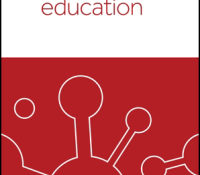tandfonline.com har udgivet en rapport under søgningen “Teacher Education Mathematics”: ABSTRACT ABSTRACT This article discusses how mathematics didactics can be inspired by and further developed through responsive pedagogy, understood as feedback directed at self-regulation and self-efficacy, in mathematics teaching. The authors explain the rationale behind an intervention model for improving mathematics teachers’ feedback practices. The model is a developmental framework for intervention that is context dependent, rather than a fixed model for intervention. The overall aim with such an intervention is to establish a recursive feedback dialogue between teachers and students. Next, the backdrop for the participatory approach used in the development and implementation of such an intervention model is presented, emphasising the importance of researchers and teachers working closely together and engaging in mutual learning. The aim is to… Continue Reading →
Like this:
Like Loading...
tandfonline.com har udgivet en rapport under søgningen “Teacher Education Mathematics”: Abstract Abstract Although advances have been made in educational research, broad discrepancies continue in the educational experiences and outcomes of subgroups of youth. Research that focus on “what works” and tiered-models of evidence-based practices may not be well suited for tailoring interventions to support diverse learners. Building from dynamic systems and ecological perspectives of development, this article considers how educational research can be reformed to be responsive to cultural and ecological factors that impact the relevance of educational practices and student outcomes. Research is needed that fosters supported professionalism for teachers and promotes their expertise to use data to adapt interventions to the needs of subgroups. It is suggested that tiered systems of adaptive supports can be developed to better… Continue Reading →
Like this:
Like Loading...
eric.ed.gov har udgivet: This study documents and describes efforts to develop robust forms of pre-service teachers’ pedagogical content knowledge through a culturally responsive mathematics teaching approach. Embedded in a university K-8 mathematics methods course emphasising the connections among mathematics, children’s mathematical thinking, and children’s cultural/linguistic funds of knowledge, pre-service teachers (N = 40) were given an assignment to analyse their own mathematics lessons utilizing a rubric tool with categories about children’s mathematical thinking, academic language supports, cultural funds of knowledge, and critical math/social justice. Utilizing a mixed methods approach to analyse the pre-service teachers’ (PST) work, we found the highest average self-ratings across the categories associated with children’s mathematical thinking and high variability in the categories related to language, culture, and social justice. To understand the variation within the latter… Continue Reading →
Like this:
Like Loading...

tandfonline.com har udgivet en rapport under søgningen “Teacher Education Mathematics”: Abstract Abstract In this study, we examine the short-term effects of an intervention aimed at developing teachers’ responsive pedagogy in mathematics. The study analyses how an emphasis on responsive pedagogy in 9th grade classrooms over a period of seven months might strengthen students’ feedback, self-regulated learning, self-efficacy and achievement in mathematics. Nine schools attended as intervention group (N = 40 classes; 1003 students). 11 compatible schools (N = 37 classes; 896 students) were recruited as a control group. Students responded to a pre-post questionnaire and conducted a pre-post achievement test. Results show small, significant differences between the total scores for the pre- and post-measures in the intervention group for the variables elaboration, task value motivation, effort and persistence, self-efficacy and self-conception. Significant differences between… Continue Reading →
Like this:
Like Loading...


